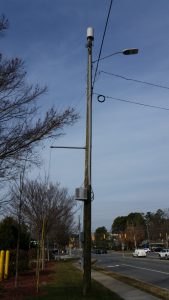I’d been a bit puzzled by all of the microcell sites I’ve seen popping up around town. The first I found was the one behind Adventure Landing on Capital Boulevard a few years ago. Since then, more and more have appeared at locations like Hillsborough Street near N.C. State, Cameron Village Shopping Center, Red Hat Amphitheater, St. Augustine University, outside the Subway on Creekside Drive, and the one pictured above outside of Costco on Six Forks Road near Wake Forest Road.
Many of these new towers sit almost literally in the shadow of massive, existing towers. Why were all of these micro towers going up in places that already have clearly good coverage?
Then the Eureka moment hit me. These cheap, utility-pole cell sites are poaching cellphone users away from the massive towers and collecting the connection fees!
You see, mobile phones will connect to whatever tower appears stronger. Thus, a station on a utility pole might provide a stronger signal to a phone than a massive tower just a block away, simply from the fact that it’s closer. These microcell sites are positioned as close as possible to places where people congregate, whether its a sporting event, a mall, a university, the local gym, or even the gas line at Costco.
It cost AT&T, for example, a massive investment to get a tower permit, pay for a property easement, do a frequency survey, and load up their new tower with antennas and transmitters. On the other hand, these microcell providers rent space on a utility pole, bolt on a few suitcase-sized boxes, and the money comes rolling in. As long as a competitor doesn’t leap-frog them to get even closer to their customers they can bleed the full-size tower site dry of calls and data.
So, here’s where things could get even more interesting for someone who dabbles in disruptive technology! What if femtocells, the phone-book-sized cellphone signal booster boxes, were scattered here and there? What if any business owner could easily create their own, indoor cell site for their customers to use? What if the local sandwich shop made money not only on bread and deli meats but also collected fees from their customers’ cell phone companies while they dined? It could happen, and make those utility-pole cell sites obsolete as quickly as they appeared.
We live in interesting times, don’t we?

I thought they were for services like AT&T and Spectrum and Time-Warner?